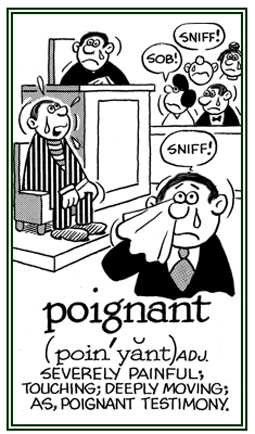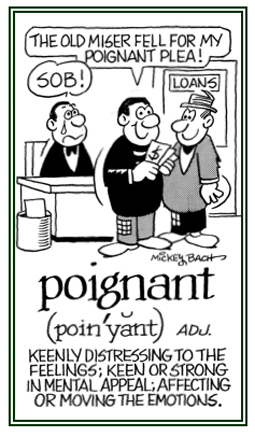You searched for:
“most poignant”
poignant (adjective), more poignant, most poignant
1. Physically painful: Sharp poignant agonies seemed to shoot from Jim's neck downward.
2. Very distressing to the mind or feelings: Sally was at the point of poignant anxiety regarding her father’s state of health, and it was a great relief when the doctor’s diagnosis turned out to be negative because he said that her father didn’t have cancer after all.
3. Profoundly moving; emotionally touching: Janet had a very poignant memory of her best girlfriend’s wedding because she was radiating with joy and so beautiful in her white dress. In fact, Janet was so affected by the simple, yet elegant service, that she had to reach for her hanky to dry her tears!
4. Piercing; incisive: Linda’s poignant criticism was aimed at her sister, telling her that she had no right to borrow her dress without asking first.
5. Neat, skillful, and to the point: There were some very poignant illustrations supplementing the fairy tales by Hans Christian Andersen, taking the young reader into the world of fantasy with characters; such as “Thumbelina” or “The Wild Swans”.
6. Astute and pertinent; relevant: The supervisor made some very poignant suggestions to the student teacher on how he could catch the students’ complete attention and motivate them at the beginning of the lesson.
7. Agreeably intense or stimulating: Lynn was filled with very poignant delight when she was planning a trip to California with her two daughters to show them where she came from, especially since she had not been there in more than 40 years!
8, Etymology: from Latin pungere, "stick into, pierce". The sense of poignant, "sharp, piercing" was adopted into French through Anglo-French as poindre. It went into Middle English as poynaunt, then during the 1700s, the French spelling was restored and poignant became the standard form of the word.

© ALL rights are reserved.

© ALL rights are reserved.
Go to this Word A Day Revisited Index
2. Very distressing to the mind or feelings: Sally was at the point of poignant anxiety regarding her father’s state of health, and it was a great relief when the doctor’s diagnosis turned out to be negative because he said that her father didn’t have cancer after all.
3. Profoundly moving; emotionally touching: Janet had a very poignant memory of her best girlfriend’s wedding because she was radiating with joy and so beautiful in her white dress. In fact, Janet was so affected by the simple, yet elegant service, that she had to reach for her hanky to dry her tears!
4. Piercing; incisive: Linda’s poignant criticism was aimed at her sister, telling her that she had no right to borrow her dress without asking first.
5. Neat, skillful, and to the point: There were some very poignant illustrations supplementing the fairy tales by Hans Christian Andersen, taking the young reader into the world of fantasy with characters; such as “Thumbelina” or “The Wild Swans”.
6. Astute and pertinent; relevant: The supervisor made some very poignant suggestions to the student teacher on how he could catch the students’ complete attention and motivate them at the beginning of the lesson.
7. Agreeably intense or stimulating: Lynn was filled with very poignant delight when she was planning a trip to California with her two daughters to show them where she came from, especially since she had not been there in more than 40 years!
8, Etymology: from Latin pungere, "stick into, pierce". The sense of poignant, "sharp, piercing" was adopted into French through Anglo-French as poindre. It went into Middle English as poynaunt, then during the 1700s, the French spelling was restored and poignant became the standard form of the word.


Go to this Word A Day Revisited Index
so you can see more of Mickey Bach's cartoons.
This entry is located in the following unit:
pung-, punc-, punct-
(page 4)
Word Entries at Get Words:
“most poignant”
Descriptive of being deeply moving or very touching and emotional. (2)
This entry is located in the following unit:
Word a Day Revisited Index of Cartoons Illustrating the Meanings of Words
(page 62)
